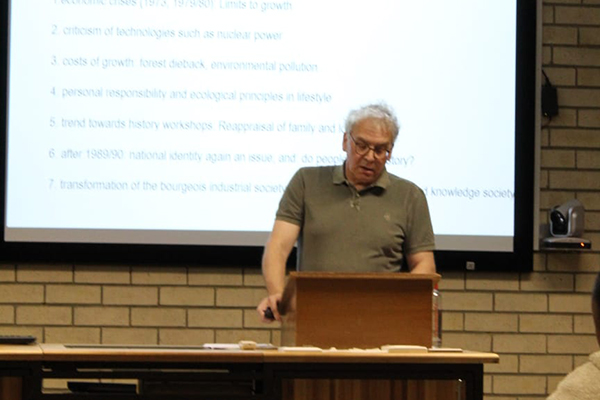North-West University School of Social Sciences Fosters Long-Term Collaboration
The School of Social Sciences at the North-West University (NWU) recently hosted a delegation from the Johannes Gutenberg University of Mainz. The visit proved to be an enriching experience, with insightful presentations and meaningful discussions.
During their visit, Dr Regina Schäfer, Prof Dr Jörg Rogge and Dr Verena von Wiczlinski shared presentations on their research.
Dr Schäfer’s lecture on “Doing fruntschaft between neighbours: Negotiating the conditions of living together in the late Middle Ages” provided a fascinating look into historical social dynamics.
Additionally, Dr Von Wiczlinski’s exploration of “Transformation of judicial systems in the German States after 1945: Doing Democracy?” shed light on the evolving legal landscape post-World War II. Her project on the transformation of judicial systems in the German states after 1945 is a significant contribution to contemporary legal history. Her detailed analysis of the post-war era aligns with her commitment to understanding historical and cultural transitions.
Prof Dr Rogge shared his expertise on “Cultural history and its different approaches.” His insights into the development of new questions and interpretations of German history post-German unification were thought-provoking. His expertise in cultural history and gender history added valuable academic depth to the discussions.
However, the visit encompassed more than just presentations, it also provided a platform for fostering collaboration and academic networking. Prof Elize van Eeden, deputy director of the School of Social Sciences, emphasised the significance of this initiative in establishing a healthy academic network.
“The discussions revolved around opportunities for co-research, co-writing in book formats, and co-lecturing through exchange programmes. Plans were set in motion for postgraduates to engage in this collaborative process, further enriching their academic journey,” she added.
“The visit was a testament to the power of international academic exchange. It not only provided a platform for sharing knowledge, but also sowed the seeds for long-term collaborative endeavours. The encouragement of cross-border academic interactions, as exemplified by this visit, has the potential to enrich the academic landscape on a global scale. We look forward to more such collaborations that broaden our horisons and deepen our scholarly pursuits,” said Prof van Eeden.

